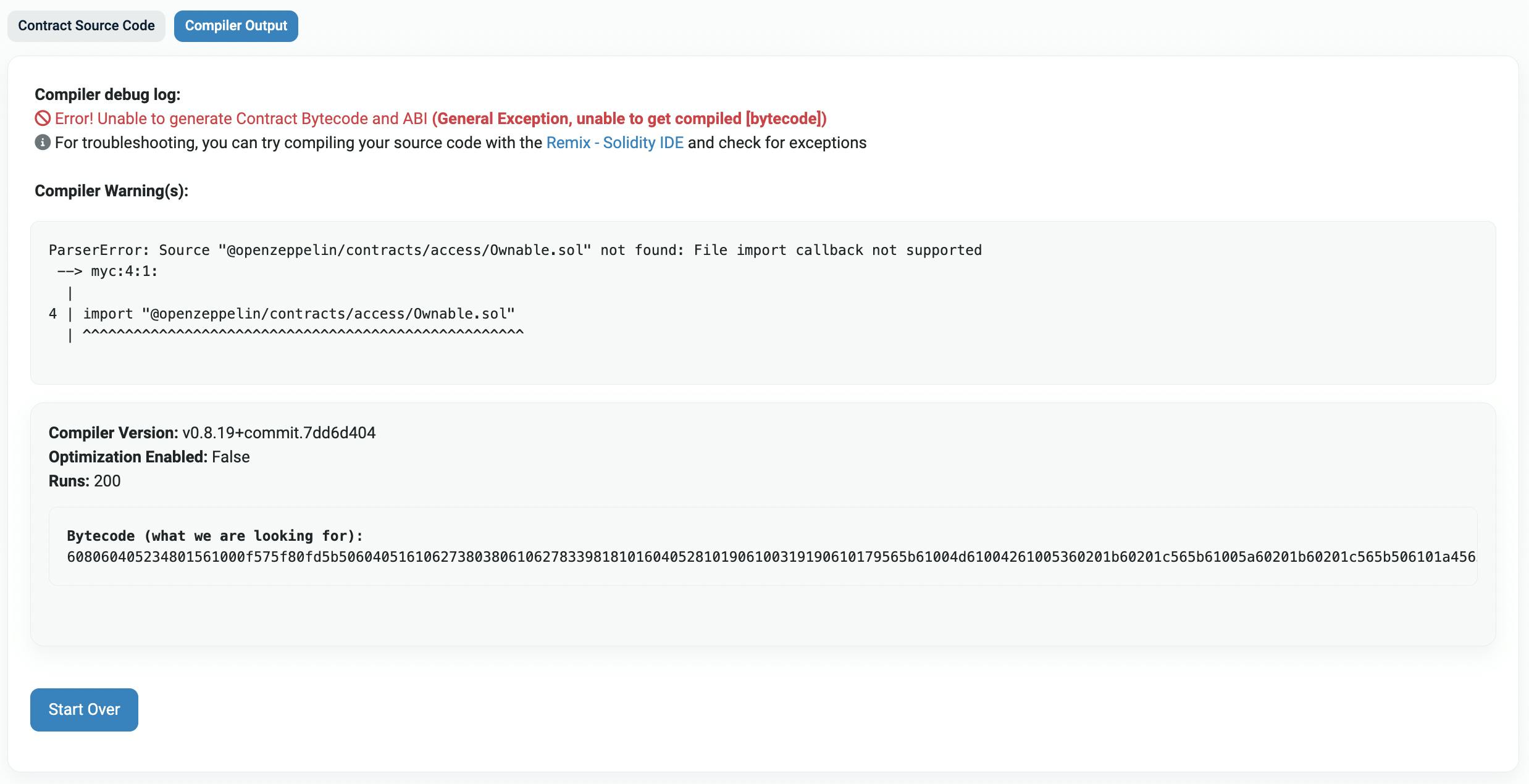Table of contents
Introduction
I have encountered the problem of verifying Smart Contracts when I use external libraries like OpenZeppelin or ChainLink. You will find that the simple process of using the explorer verification options doesn't work and neither will attempting the verification via the CLI. In this article, I'll demonstrate the use of the Flattened Smart Contracts feature available in Remix IDE to carry out the verification of a Smart Contract.
Smart Contract
Go to Open Zeppelin, and open the Smart Contract Wizard. We will build a simple Access Control with ONLY OWNER modifier can transferOwnership of the Smart Contract
Open the Remix IDE and paste the code:
//SPDX-License-Identifier: MIT
pragma solidity ^0.8.20;
import "@openzeppelin/contracts/access/Ownable.sol";
contract MyContract is Ownable {
constructor(address initialOwner) {
transferOwnership(initialOwner);
}
}
Compile the Smart Contract. Add your MetaMask to Remix via the Injected Provider option.

Deploy the Smart Contract to any selected Testnet of your choice. The deployed Smart Contract gives us access to the following functions:
RenounceOwnership , transferOwnership and owner
Verification
If we attempt to verify the Contract on Etherscan, it will give us an error:


To fix this error, we will "flatten the Smart Contract". The Flattener plugin is an “internal plugin” in the Remix IDE making it a part of the Remix codebase.
Prior to the update, it was required to be loaded as a plugin in the Plugin Manager, but can now just right-click on a file in the File Explorer to pop up the context menu. The Flattener is available as the Flatten option in the context menu.
Flatten Smart Contract
Open the Remix IDE, left click on the Smart Contract file in directory and click on Flatten This will generate a "flattened" version of the codebase which we can pass to EtherScan for Verification.

Copy the contents of the flattened version of the codebase and follow the steps to do the EtherScan verification.
// File: @openzeppelin/contracts/utils/Context.sol
// OpenZeppelin Contracts v4.4.1 (utils/Context.sol)
pragma solidity ^0.8.0;
/**
* @dev Provides information about the current execution context, including the
* sender of the transaction and its data. While these are generally available
* via msg.sender and msg.data, they should not be accessed in such a direct
* manner, since when dealing with meta-transactions the account sending and
* paying for execution may not be the actual sender (as far as an application
* is concerned).
*
* This contract is only required for intermediate, library-like contracts.
*/
abstract contract Context {
function _msgSender() internal view virtual returns (address) {
return msg.sender;
}
function _msgData() internal view virtual returns (bytes calldata) {
return msg.data;
}
}
// File: @openzeppelin/contracts/access/Ownable.sol
// OpenZeppelin Contracts (last updated v4.9.0) (access/Ownable.sol)
pragma solidity ^0.8.0;
/**
* @dev Contract module which provides a basic access control mechanism, where
* there is an account (an owner) that can be granted exclusive access to
* specific functions.
*
* By default, the owner account will be the one that deploys the contract. This
* can later be changed with {transferOwnership}.
*
* This module is used through inheritance. It will make available the modifier
* `onlyOwner`, which can be applied to your functions to restrict their use to
* the owner.
*/
abstract contract Ownable is Context {
address private _owner;
event OwnershipTransferred(address indexed previousOwner, address indexed newOwner);
/**
* @dev Initializes the contract setting the deployer as the initial owner.
*/
constructor() {
_transferOwnership(_msgSender());
}
/**
* @dev Throws if called by any account other than the owner.
*/
modifier onlyOwner() {
_checkOwner();
_;
}
/**
* @dev Returns the address of the current owner.
*/
function owner() public view virtual returns (address) {
return _owner;
}
/**
* @dev Throws if the sender is not the owner.
*/
function _checkOwner() internal view virtual {
require(owner() == _msgSender(), "Ownable: caller is not the owner");
}
/**
* @dev Leaves the contract without owner. It will not be possible to call
* `onlyOwner` functions. Can only be called by the current owner.
*
* NOTE: Renouncing ownership will leave the contract without an owner,
* thereby disabling any functionality that is only available to the owner.
*/
function renounceOwnership() public virtual onlyOwner {
_transferOwnership(address(0));
}
/**
* @dev Transfers ownership of the contract to a new account (`newOwner`).
* Can only be called by the current owner.
*/
function transferOwnership(address newOwner) public virtual onlyOwner {
require(newOwner != address(0), "Ownable: new owner is the zero address");
_transferOwnership(newOwner);
}
/**
* @dev Transfers ownership of the contract to a new account (`newOwner`).
* Internal function without access restriction.
*/
function _transferOwnership(address newOwner) internal virtual {
address oldOwner = _owner;
_owner = newOwner;
emit OwnershipTransferred(oldOwner, newOwner);
}
}
// File: MyContract.sol
//SPDX-License-Identifier: MIT
pragma solidity ^0.8.20;
contract MyContract is Ownable {
constructor(address initialOwner) {
transferOwnership(initialOwner);
}
}

AND, that is how it is done, Ladies and Gentlemen, Boys and Girls! 🥂
Reference: https://medium.com/remix-ide/remix-ide-v0-30-0-release-8ee6bb8bcb5f
